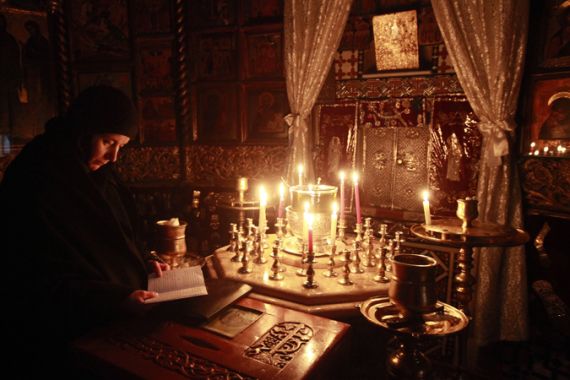Syria rebels ‘attacked’ religious sites
Rights group says fighters have burned and looted Christian and Shia places of worship, increasing sectarian fears.

Rebels in Syria have burned and looted the religious sites of minorities, Human Rights Watch says, warning that the 22-month old conflict could become increasingly sectarian.
“The destruction of religious sites is furthering sectarian fears and compounding the tragedies of the country, with tens of thousands killed,” Sarah Leah Whitson, Middle East director of the US-based rights group, said on Wednesday.
“Syria will lose its rich cultural and religious diversity if armed groups do not respect places of worship. Leaders on both sides should send a message that those who attack these sites will be held accountable.”
In the village of Zarzour in Idlib province, researchers found evidence of deliberate damage to the local husseiniya, a Shia place of worship, caused by opposition fighters in December.
Its windows were broken, prayer stones littered on the floor, walls charred from flames, and what appeared to be the remnants of a burned prayer rug lay on the floor.
Footage posted online showed rebels celebrating their victory in the town as the husseiniya burns in the background.
Residents said the army had been using the husseiniya as a barracks. Human Rights Watch condemned the government’s use of the husseiniya for military purposes, but said that did not justify intentional damage by the rebels.
The rights group said local rebel fighters had blamed Syria’s government for the damage but residents said opposition fighters had started the fire when they took control of the village.
Residents of Zarzour, a predominantly Sunni village, said their Shia neighbours fled fearing retaliation for supporting the government.
Churches looted
In the Christian villages of Ghasaniyeh and Jdeideh in Latakia province, residents said that gunmen operating “in the name of the opposition” broke into and stole from churches in November.
A resident in Jdeideh cited by the rights group said armed men had broken into the local church, stolen and fired shots inside, after government troops had fled.
Local rebels denied they attacked the church.
“While the motivation for the church break-ins may have been theft rather than a religious attack, opposition fighters have a responsibility to protect religious sites in areas under their control from wilful damage and theft,” Human Rights Watch said.
The group has previously documented the destruction and vandalisation of a mosque in Taftanaz, Idlib by government forces.
Many mosques have been destroyed in shelling by regime forces.
About 70 percent of Syria’s population are Sunni Muslims, and a majority of the rebel ranks are Sunnis.
Many members of minorities – including Christians, Shias and Alawites – have stayed on the sidelines of the conflict or supported President Bashar al-Assad, who is an Alawite.
Assad has portrayed his regime as a protector of minorities and has blamed the uprising in his country on Muslim extremists and foreign countries.
The opposition, however, is accusing the regime of igniting sectarian strife.